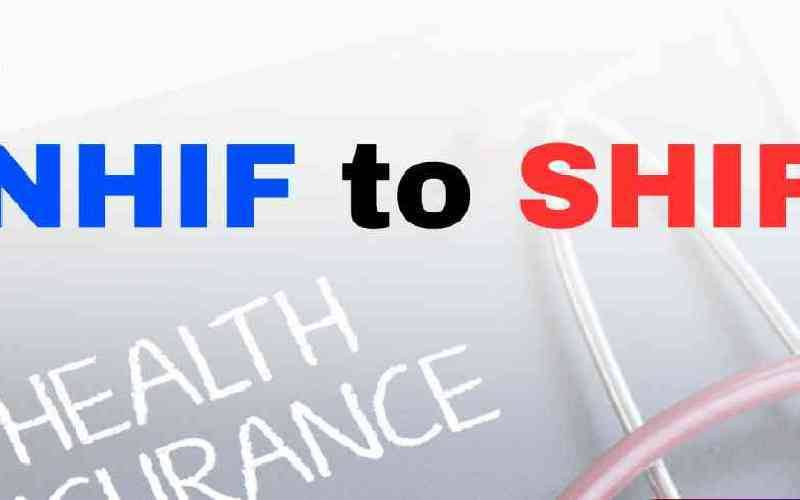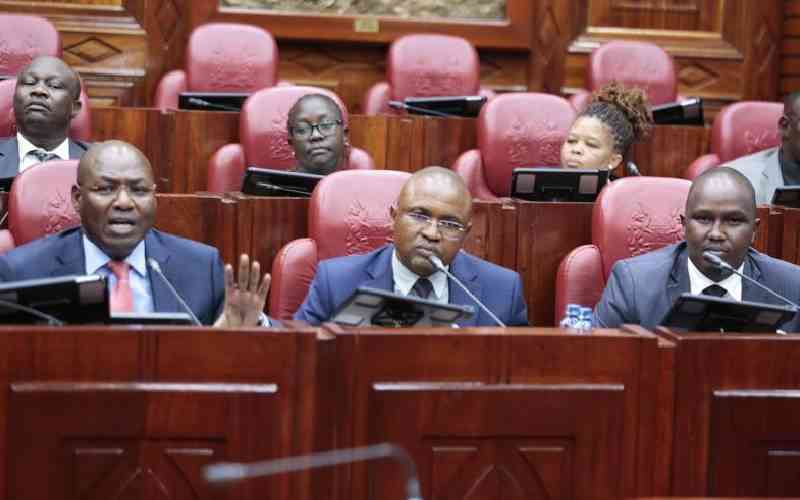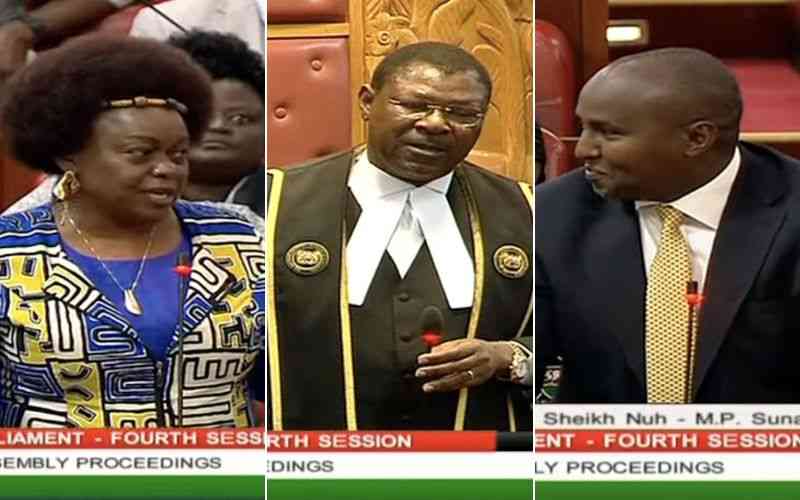The Ministry of Health now says low contributions are to blame for SHA failures.
Appearing before the National Assembly Committee on Health, Principal Secretary Harry Kimtai said out of the 18 million Kenyans who are registered on SHA, only 4 million are making the contributions.
Kimtai said this leaves out about 14 million who are not paying the monthly 2.75 per cent to the scheme.
The PS said the most significant challenge lies within the informal sector, which accounts for approximately 80 per cent of the population who are expected to remit their pay through means testing.
“There is a disparity between the registered persons which is 18 million individuals against the four million who are actively contributing financially,” the PS told the committee
Hard-pressed to explain how informal sector workers would be included in the scheme, Kimtai said SHA has adopted a multipronged approach.
This includes enhanced engagement through sensitization campaigns, partnerships with county governments, collaboration with informal sector groups, and integration with existing structures such as SACCOs and chamas, in addition to educating the public on the importance of payment.
READ: MPs: Chaotic rollout of SHA adds more pain to patients
He told the committee the financing gap has been caused by a low contribution occasioned by irregular income, limited financial literacy, and difficulty accessing formal financial systems.
At least 30 per cent of the population is also unable to afford contributions that require government subsidy, and the indigents are being identified.
In a heated debate, committee members demanded clarification on whether SHA has categorised healthcare facilities where Kenyans can access services. They also sought details on benefit tariffs, emphasising that many citizens remain unaware of the services covered under the scheme.
But in defense, PS Kimtai said the hospital vetting process is ongoing and once complete, a list will be made public, an explanation that was interjected by the committee chairperson Robert Pukose who noted the need “to move with speed. “This information has to be out there” said the committee chairperson who gave the ministry a timeline of one month to provide the information.
Kimtai was further taken to task to explain disparity experiences in overseas treatment that have left hundreds of Kenyans stranded on whether they are covered under the scheme, and why the treatment was capped at only Sh500,000.
Nyeri MP Duncan Mathenge further questioned why a majority of patients were being referred to India, raising the possibility of colluding with SHA officials who allegedly get commissions from referrals.
Stay informed. Subscribe to our newsletter
Mathenge gave an example where his mother wanted to seek services overseas, but approval took longer as the treatment wasn’t taking place in India.
His Kitutu Chache South counterpart Anthony Kibagendi demanded answers on why the process of oversees referral was frustrating patients seeking treatment.
“You have been telling patients you’re yet to establish where patients should go and have denied patients who want to go.
I am not happy with how you try to demonstrate it’s okay and things are going well. SHA is frustrating patients who want to seek services beyond our borders,” the legislator said.

Mogotio MP Reuben Kiborek on his part said though he cannot complain about referral systems, the spirit of SHA was to stop fundraising, and pleased with the Ministry of Health and SHA leadership to enhance the package capped at Sh500,000.
“To avoid going back to problems we had with NHIF, we need to improve on grey areas,” said Kiborek who further said proper communication needs to be done on benefit tariffs to boost enrolment and healthcare.
READ: Unconsented transition from NHIF to SHA is lawful- Ministry
Nandi Woman Representative Cynthia Muge pleaded with SHA to negotiate with hospitals that offer overseas treatment to avoid quotation on charges.
In response to overseas treatment, the PS distanced himself from negotiation saying such can only be done by doctors, hospitals and families of patients seeking care.
Kimtai explained that the Kenya Medical Practitioners and Dentists Council (KMPDC) is the entity recognized by law to recommend for empanelment of overseas treatment and that SHA only goes to contracting.
“Approval of oversees treatment is based on the preference of the doctor and where treatment will be done and gives recommendations to KMPDC. SHA only issues a guarantee of payment to that facility.
“We shall only give Sh500,000 we do not come in for negotiations because it is between the patient and the doctor and facility. It should be based on a referral system,” Kimtai informed the committee.
Pukose added that the lack of proper referral structure and the problem incurred is giving SHA a “bad image”.
On the capped overseas allocation, Seme MP James Nyikal said SHA should rethink what the Sh500,000 can offer, further noting the need for a proper referral system.
Nyikal observed that some referrals are done by doctors who are ‘tired’ of providing care
An issue of patients seeking chronic and critical illness services in Kenya’s public hospitals being forced to pay out of pocket due to the ongoing government financial crisis was also raised during the probe.
The SHA funding shortfall was said to disrupt the financing of healthcare services across level two to level six hospitals.
Kimtai informed the National Assembly Health Committee that SHIF is only partially operational and currently covers emergency services for the first 24 hours after admission.
“At the moment, the fund provides coverage for urgent care, resuscitation, and stabilisation for specific emergency services as outlined in the Gazetted benefit package,” Kimtai explained to the committee.
Kimtai added that the services are free for the initial 24 hours, as the fund is Exchequer-funded.
However, he says that due to financial constraints in the current fiscal year, the chronic and clinical illness components of the fund have not been activated.
Amid decry by Kenyans in need of care, Kimtai informed the committee that the emergency, chronic, and critical illness package was only partially operationalized in December, covering emergency services exclusively in level five and level six hospitals.
The financial crisis has therefore left many patients who suffer chronic diseases unable to access the health package, resulting in numerous individuals being turned away from hospitals due to confusion over SHIF’s implementation and budgetary constraints.
“The implementation did not take effect immediately after the rollout on October 1, 2024.
The system for these specific services was activated in December, starting with level five and six hospitals. As a result, claims only began coming in at the end of December,” SHA director for benefits and claims management Dr Tracy John said.
Additionally, Anthony Lenaiyara, CEO of the Digital Health Agency, confirmed that by last month, 21.6 million claims had been submitted under the fund, which was allocated Sh2 billion in the current financial year’s budget, including cases such as cardiac and pulmonary arrest, and major trauma.
ALSO READ: Health CS Barasa says transition to SHA successful despite hitches
Nevertheless, the benefit tariff on dental and optic care was also raised by the Pukose committee as an issue of concern among Kenyans.
Nyeri MP said in the benefit tariffs, SHA is encouraging the extraction of teeth which is criminal according to the World Health Organisation.
Muge raised an issue with the allocation for optical and oral capped at Sh1,000 and Sh2,000 annually for a household, noting that the allocation was too little, an issue that was backed by the committee chairperson.
“Providing Sh1,000 for a household for the entire year is unfair. This should be looked at,” said Pukose.
PS Kimtai acknowledged the low allocation for the services and promised to have tariffs re-looked at.










